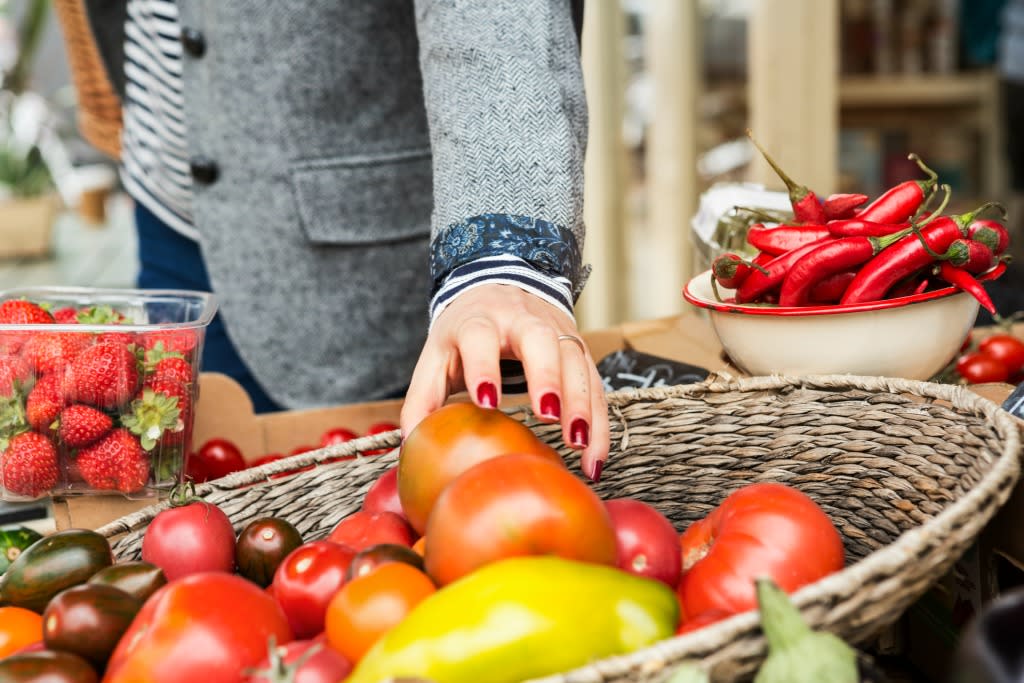‘Food Has a Body Image Issue’: Why Americans Prefer Pretty Produce

A new food phenomenon is bringing new meaning to the saying “you are what you eat.” It seems we’re actually projecting our image insecurities onto the fruits and vegetables we shop for at our local supermarkets, according to Salon.
If this sounds ridiculous, it’s because it is — and chef Evan Hanczor will be the first to admit it. Hanczor identified the problem in a Facebook Live broadcast with moderator Josh Zepps at the Democratic National Convention on Wednesday. “We waste 40 percent of food produced in the country,” said Hanczor, a food policy advocate and chef-partner at Egg Restaurant in Brooklyn, N.Y.
Yes, that statistic is 40 percent — dangerously close to half of the food produced in the U.S. — and it’s backed up by the Food and Agriculture Organization. Hanczor calls the situation “absolutely insane.” He explained that it’s not just consumers wasting food, but it is a reaction to our reticence to buy “ugly” food. Farmers, he explains, won’t bother picking produce that isn’t going to sell, and even retailers will send back food that doesn’t meet aesthetic standards. The rest of that percentage is wasted due to factors like droughts and transportation disruptions.
Story: Fitness Blogger Urges Us to Stop Obsessing Over the Number on the Scale
“Food has a body image issue in America,” Hanczor says outright. “People don’t want to buy bruised or misshapen … fruits and vegetables.” Zepps, an Australian media personality who does not work in the food business, agrees, saying, “Everyone wants their tomato to be big and red and tasteless, instead of small and weird-looking and [flavorful].”
According to an article on Slate, bruises are perhaps the only unsightly produce characteristic to be concerned about — and even then, it doesn’t mean you can’t or shouldn’t eat the fruit or vegetable. Bruises can cause produce to oxidize, but “there’s no evidence … that oxidized food is bad for you.” The writer goes on to explain that bruising can make a piece of fruit more quickly susceptible to mold and infection, so this produce should simply be eaten sooner. “But if you can’t be bothered to trim your bruised banana or bake it into bread, there’s little risk to your health in just eating it.”
Story: 9 Celebrity Beards We Wouldn’t Mind Stroking
That said, misshapen fruit has absolutely no adverse health effects at all — it’s just that our image-obsessed culture has brainwashed us to reject anything that doesn’t look “perfect.” In response to this growing epidemic, it was announced in March that Whole Foods would be teaming up with California-based company Imperfect Produce to “to sell misshapen, bruised, or otherwise ‘imperfect’ fruits and vegetables in their stores,” according to ThinkProgress. Imperfect Produce’s mission is to deliver misshapen fruits and vegetables at discounted prices to customers in the Oakland and Berkeley areas of California, and the partnership with Whole Foods has started in Northern California but will hopefully spread throughout the country from there.
The program is the result of a petition put forth by a culinary nutritionist and a food waste activist from @UglyFruitandVeg, who were determined to educate consumers about the far-reaching practice of rejecting food that isn’t beautiful to the eye. “As a business, our goal is zero waste, and we’re always looking for ways to reduce our collective impact and positively influence the industry,” said Liz Burkhart, senior media relations specialist for Whole Foods.
I like big pears and I cannot lie! ???????????? Pic by @ollywood_23
A photo posted by The Ugly Fruit & Veg Campaign (@uglyfruitandveg) on Jul 27, 2016 at 10:34am PDT
Wasted produce is not only, well, a waste, but according to the Center for American Progress, it’s also detrimental to the environment. Vast amounts of decomposing fruits and vegetables give off enough methane — a greenhouse gas that’s 86 times as powerful as carbon dioxide, the article says — to make a significant impact.
And it isn’t just the U.S. that’s jumping on the bandwagon to promote ugly produce. Countries including France and Canada have started programs to reduce food waste by selling bruised and misshapen food for a steal. But, according to Jordan Figueiredo, who runs @UglyFruitandVeg, sometimes it takes heavy hitters like Whole Foods to really demonstrate that this problem is something to be taken seriously; that it’s more than just skin-deep.
And seriously, how cute are “ugly” fruits and vegetables?
A photo posted by The Ugly Fruit & Veg Campaign (@uglyfruitandveg) on Jul 25, 2016 at 8:42am PDT
Let’s keep in touch! Follow Yahoo Beauty on Facebook, Twitter, Instagram, and Pinterest.

